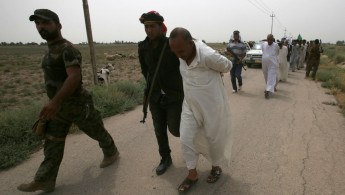UN slams speed-up of 'vengeance executions' in Iraq
The UN has expressed concern that efforts by the Iraqi premier to speed up the implementation of executions will only "accelerate injustice".
Prime Minister Haider al-Abadi last month ordered the formation of a committee to identify factors that are delaying the implementation of the death penalty and to make recommendations on how to speed up the process.
"Given the weaknesses of the Iraqi justice system, and the current environment in Iraq, I am gravely concerned that innocent people have been and may continue to be convicted and executed," UN High Commissioner for Human Rights Zeid Ra'ad Al Hussein said in an online statement.
"Fast-tracking executions will only accelerate injustice," Zeid said.
UN monitoring "has revealed a consistent failure to respect due process and fair trial standards, including a reliance on torture to extract confessions", according to the statement.
Iraq has for years faced widespread criticism from diplomats, analysts and human rights groups who have said that, due to a flawed justice system, those being executed are not necessarily guilty of the crimes for which they were sentenced to die.
 |
|
| Iraqis have sharply criticised the government for the attacks [Getty] |
Following a bombing in Baghdad that killed 323 people earlier this month, the justice ministry announced that five people had been put to death in a statement, linking the timing of the executions with the blast.
Zeid said that, with Iraqis facing frequent attacks, including by the Islamic State group [IS], "it becomes all too easy to permit such atrocities to stoke the fires of vengeance".
"But vengeance is not justice."
Last month, a total of 629 Iraqi civilians were killed and 1,061 were injured in acts of terrorism and armed conflict in Iraq, excluding Anbar province.
IS overran large areas north and west of Baghdad in 2014, but Iraqi forces have since regained significant ground and are conducting operations to set the stage for the battle to recapture Mosul, the last IS-held city in the country.
IS has responded to battlefield setbacks by striking civilians with experts warning that there may be more such attacks as the jihadists continue to lose ground.





 Follow the Middle East's top stories in English at The New Arab on Google News
Follow the Middle East's top stories in English at The New Arab on Google News
![Israeli forces ordered bombed Gaza's Jabalia, ordering residents to leave [Getty]](/sites/default/files/styles/image_330x185/public/2176418030.jpeg?h=a5f2f23a&itok=_YGZaP1z)

